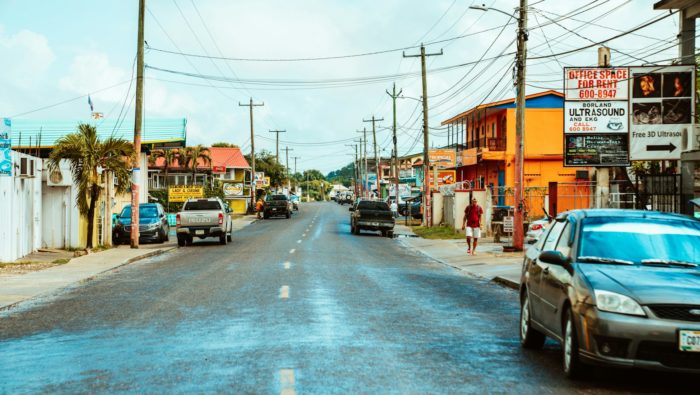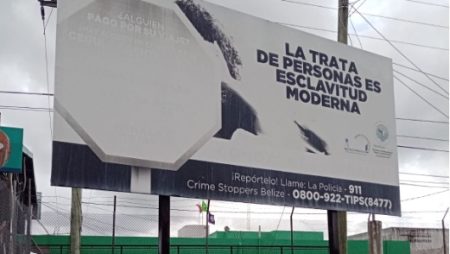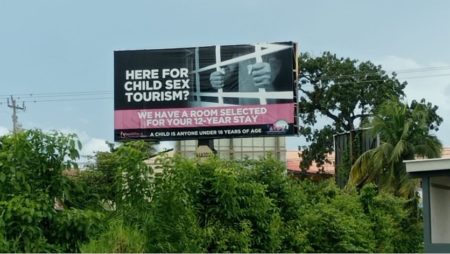
Chasing Billboards: Reflections on Building a Methodology or Finding One Along the Way

I write this piece to encourage Early Career Researchers that their ways of ‘doing’ have value. It is a reflection on my journey with methodology and belonging, the challenges that arose while locating billboards as a data source during fieldwork, and what I learned through the process.
At the beginning of my PhD, the idea of methods and theoretical frameworks haunted me. My work was being written for a Caribbean audience and required a Caribbean voice. However, I was researching from a UK institution where the way that felt authentic to conduct Caribbean research was not the ‘norm’. As I read about various methodological approaches, they all felt too rigid for my work.
My PhD thesis interrogates anti-trafficking in persons activity in the Anglophone Caribbean. A critical element was interviewing anti-trafficking stakeholders and deconstructing campaigns to assess how various social, cultural, and historical factors affect their levels of effectiveness. One of my case study countries was Belize, a small English-speaking Caribbean nation in Central America. I called Belize home in 2019 and 2020 while working as a legal professional in the anti-trafficking field. This came with an ‘insider-outsider positionality’. My research was critiquing (outside) the very systems I had helped to build (inside). Some scholars advise that this positionality can compromise the objectivity of the research, but in my experience, it has been a benefit.
In 2022, I visited Belize to conduct interviews and analyse several anti-trafficking billboards. These billboards were posted along the highway and at various border entry points. I had noticed them frequently during my commutes while living in Belize. Before the trip, I planned carefully, identifying potential limitations and mitigating against them. Participants were selected using multistage criteria for ethics approvals and to ensure the validity of my work. I constructed my data collection plan and schedule to avoid last-minute changes. However, these preparations did not account for COVID-19 or Caribbean culture. I assumed that the billboards would still be standing and in relatively good condition. This notion was quickly dispelled, and stakeholders were unable to provide conclusive information on where they had gone and why.
Despite the absent billboards, complex positionality, and scheduling changes, I persisted:
In late July, I told a Belizean friend about my research and the ongoing difficulties in chasing billboards. His response was ‘you need to meet the boss-lady… if anyone will know, it is her’; WhatsApp numbers were exchanged, and a meeting was set for my arrival in Belize. On my way to meet ‘the boss-lady’, I stepped onto a public bus and was greeted by the smiling face of the marshal whose court I worked in two years ago. After explaining my trip and this particular bus journey, he assured me that the ‘boss lady’, a former immigration officer (whom, he reminded me, I had met while working in Belize), was a good person to know. He also called his daughter, who was on another bus ‘up north’ going to Guatemala, and instructed her to let him know if she saw any human trafficking billboards on her way.
The marshal left the bus, and I continued to the ‘boss-lady’s office, where she greeted me with recognition and a hug. During our conversation, she provided invaluable information and further contacts, whom I had encountered while working in Belize but did not recognise as anti-trafficking stakeholders. We spoke for hours, and I missed my second meeting that day – but such is the nature of conducting successful research in the Caribbean.
It is a meeting of old friends; you make the most well-intentioned plans, which frustratingly get derailed. By happenstance, you encounter others, who transform an otherwise ordinary and mundane day… usually ending with rum-punch and a sunset.
Excerpt from Fieldwork Notes, September 2022 (Belize)
Looking back now, every second that I was chasing billboards, my method was finding me. In Belize, my previous connections led to unexpected ‘leads’ while on the bus or having a meal. Roundabout conversations about the bureaucracy of acquiring billboard space, maintenance, and the threat of ‘hurricane season’ added nuance and depth, which eventually contributed to my analysis about the sustainability and longevity of anti-trafficking approaches. Informality is an integral part of doing ‘business’ in the Caribbean, and ‘liming’ or ‘ole talk’ are justifiable, indigenous methods of conducting research. One of the greatest skills I learned was ‘flexibility’; the chase is as critical to empirical work as the destination.
Figure 1: ATIPs Roadside Billboard at border entry point to neighbouring Spanish-speaking country

Source: Photograph taken by author, September 2022
Figure 2: ATIPs Council and Office of the Special Envoy to women and children, Anti-trafficking Overhead billboard, on Airport Road alongside Philip Goldson Highway, Belize (as individuals depart the airport and head towards the city)

Source: Photograph taken by author, September 2022

